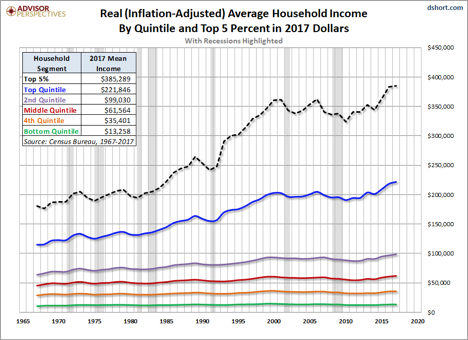Continuation.
I DO keep looking at what the rich have.
And I ask myself: Do they need it? Is it a benefit to the economic system AND society as a whole?
Who are you to decide what somebody else needs? Do you need all the money you have? Is your money a benefit to the economic system and society as a whole? How dare you insist someone else do more than you.
It SEEMS like I'm focussing on what the rich have because ultimately, the rich are the solution to the problem.
Says who? You??? Are you God now? Why can’t YOU be the solution to the problem? If they are doing more than you (and by taxes alone, I’ve got a feeling they are) who are you to judge them?
Trickledown economics essentially FORCES the rich to be the solution to the problem. They are just not solving the problem have have been simply profiting off of it for 40 years almost now.
How has the rich profited from people being poor?
Tell me: How are the bottom 10% supposed to get more money? Should they become more shrewd investors? lulz.
How am I supposed to become a pro basketball player? How am I supposed to become a rock star? Perhaps I should realize not everybody is cut out to be a pro ball player, or a rock star; and perhaps you should realize not everybody is cut out to be rich.
The ONLY way they get richer is if their bosses pay more; so again, look to the people with more money.
The quickest route to failure is to insist somebody else has to change their behavior in order for you to succeed, because when you place the responsibility of your success outside of your control, you have little motivation to even try.
And I already answered that question:
The poor are quantifiably NOT better off:
I didn’t say quantifiably better off, I said better off and I think you know they are you just don’t want to admit it.
What you see as "average wages increasing", you can see really it's just the top tax brackets that are seeing meaningful growth while everything else is stagnating.
As you see from the chart (that I borrowed from you) the more money you have the more you gain and lose. As you can see the recession we had 10 years ago, the top 5% lost a lot and the bottom lost nothing, then when it ended and the top 5% got their money back, the bottom is acting like they should be getting something back also? No! They didn’t lose anything. When the recession hit, those on welfare, or working minimum wage jobs still had their minimum wage jobs and still got their welfare checks; no cut in pay. It would be unfair for them to expect to get more on their welfare checks or an increase on their minimum wage jobs just because the economy improved, and they see the rich who lost millions get their millions back.
Why don't you allow that the middle and lower classes should be GAINING income? Why do you insist that only the top income earners should be getting more?
Nobody is stoping the middle and lower class from gaining income.
And if we're talking about problems: YOUR problem seems to be that you think the rich are doing "so much good" with their money. And yet, there is likely upwards of several trillion (perhaps more than 10) stored in off shore accounts. That money is doing nothing.
And Trump's huge tax cuts: What happenned to that money? Did it go to job creation or (gasp!) higher wages? Nope.
Funny you should ask; because they did
https://www.cnbc.com/2019/04/04/target-raises-its-minimum-wage-to-13-an-hour-aims-for-15-by-2020.html
Target raised it’s minimum wage to $13 per hr
https://www.forbes.com/sites/laurengensler/2018/01/11/walmart-raises-minimum-wage-after-tax-reform/#1348e9eb73c9
Walmart raised it’s minimum wage to $11 per hr, and handed out bonuses of up to $1,000 citing tax cuts. Lots of companies to include AT&T, Boeing, Wells Fargo and others announced raises and bonuses due to the tax cuts.
So....to be clear if we're carrying on with this analogy: The rich DID or did NOT have more on their plate to spill onto the plebians below? Because this sounds like you are playing the opposite little word game as you do with the poor people (but the opposite):
"Sure they are poor but they are not AS poor."
"The rich weren't given MORE money, just less was taken away".
You were the one playing word games, claiming Trump overloaded the plates of the rich; as if he gave them stuff. Tax cuts do not equal giving someone stuff.
Yeah. You can call it stealing. But if the rich are the ones dictating wages, dictating pay outs to their workers, dictating how much money they THEMSELVES get paid, then I would ABSOLUTELY not call it stealing.
Regardless of the "reasons" the rich get their first, the idea of the rich getting theirs first has also been shown to be a bust for economic systems.
What do you mean? How do the rich get their money before everybody else? Please explain
I will respond to the rest later

